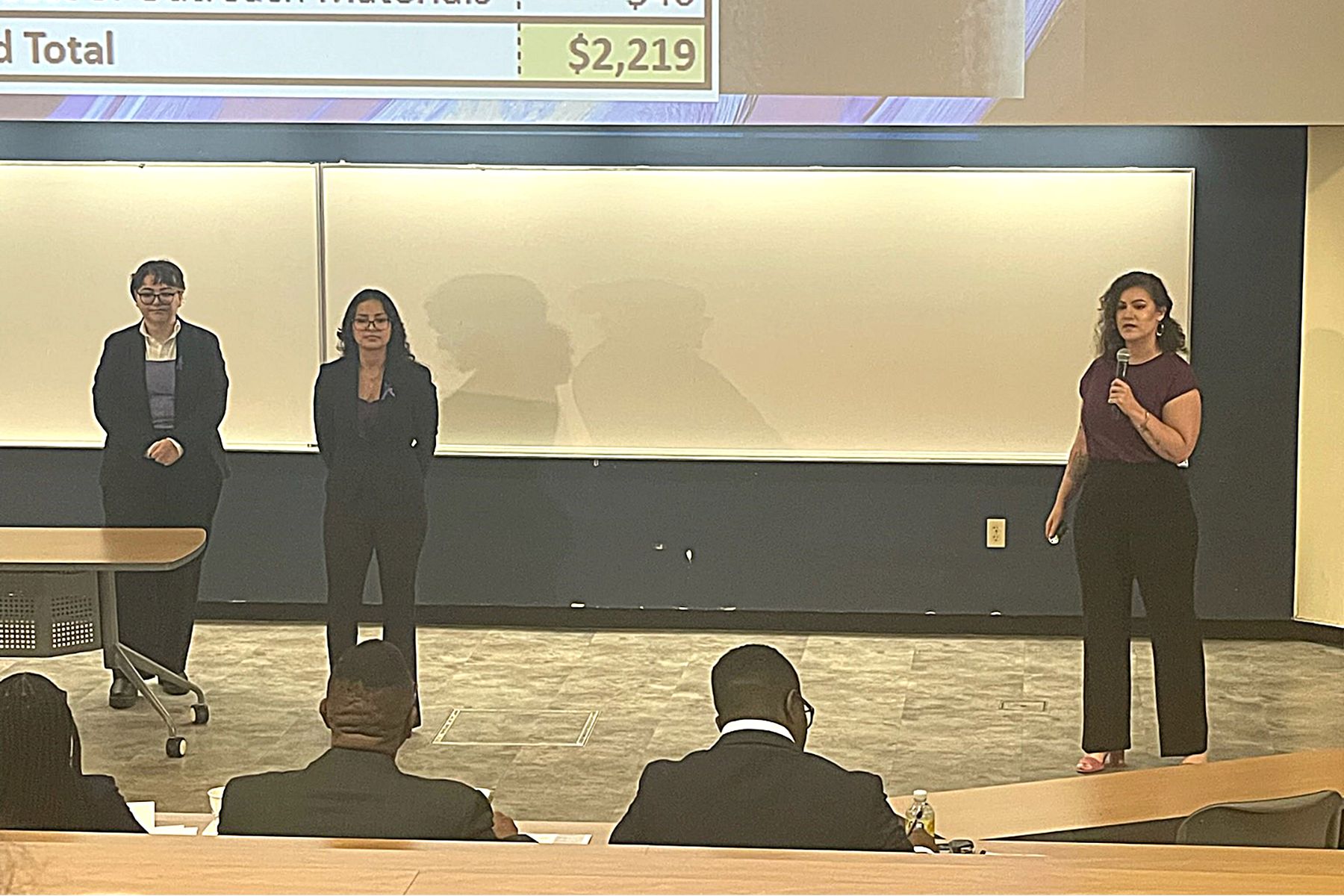
Photo caption: (From left) UB Fellows Jenna, Karina, and Nicole present their findings to guests at UB to conclude their eight-week fellowship.
This summer the Family Justice Center (FJC) has partnered with the University at Buffalo to participate in the annual Social Impact Fellowship program. This unique eight-week program prepares students to address social issues, by building student teams to pair with local organizations, to explore and address a specific issue or mission.
These teams, each made up of an MBA student from the School of Management, an MSW Student from the School of Social Work, and a graduate student from the College of Arts and Sciences, to allow three differing points of view on a particular topic.
This summer, the team of UB Fellows matched to the FJC – Karina, Jenna and Nicole – explored the world of restorative justice (RJ), and how it could be implemented to help support FJC clients who have experienced relationship abuse and/or violence.
“I wanted to participate in [this] program because of the opportunity to make an impact within the community where I’ve spent the last couple of years attending school,” Karina shared. “My impression of FJC is how dedicated and hard working the staff are. They are a family that supports each other while handling very serious cases of domestic violence.”
After learning about the FJC and services, the team jumped into research on restorative justice, and how to apply the practice to support survivors of relationship abuse and/or violence.
UB Fellow Nicole observed, “With RJ, there is an insistence on putting the survivor first, and then staying engaged in their needs throughout every step that follows. They determine how to hold the abuser accountable for the harm caused. RJ is one part of a flexible system that can mold to fit many types of needs and many types of agencies, so that survivors can be empowered to move forward with their lives.”
This approach falls very much in-line with the FJC’s approach to client services. However, the concept of restorative justice practices specific to domestic violence have historically been rejected by domestic violence service providers due to the notion that a survivor would need to re-engage with their abuser to move forward in healing.
With severe and dangerous gaps in care, specifically pertaining to domestic violence survivors of color, as well as gender and religious minorities, domestic violence agencies like the FJC are now exploring ways to bring the practice to survivors in a trauma-informed way. New ideas and solutions would allow survivors to move forward without having to re-engage with the person who abused them.
“As it stands,” said Jenna, “the traditional legal system does not consider the healing or the voices of survivors of DV. Crimes are considered to be committed ‘against the state’, and survivors are witnesses to their own experiences. In restorative justice, survivors’ needs and healing are at the center. RJ can help survivors heal on their own, in their communities, rebuild their communities, and separate themselves from the recovery or suffering of their abuser
“The FJC’s first priority for all of our clients is safety,” said Operations Manager, Ava Thomas. “As we move forward to incorporate restorative justice programming for our clients, we want to ensure we do so in a way that will keep them safe – both physically and emotionally. Healing is different for everyone, and restorative justice allows for a varied approach to healing and wellness after abuse.”
While there is still more to explore before RJ practices can be added to the FJC’s menu of services, the UB Fellowship team has laid a foundation for agency staff and volunteers to build upon, including a final report of findings and an outline for what an RJ program could look like from concept to delivery. The FJC will continue discussions with state and local stakeholders to eventually provide programming in this alternative and valuable way.
“Even huge systems, like the criminal justice one, are not more powerful than people’s collective ability to help each other,” said Nicole. “We can–and have to–build things better.”
This program has received philanthropic support from the John R. Oishei Foundation and Mary A. Bauer Family Foundation, as well as several other generous UB alumni and friend donors.
The FJC thanks the University at Buffalo, as well as our dream team of fellows: Karina, Jenna, and Nicole!
